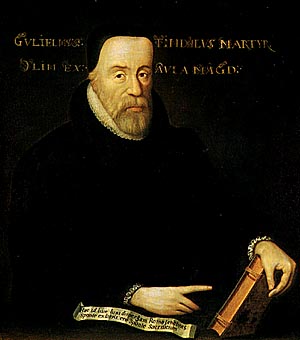William Tyndale
From Textus Receptus
| Line 1: | Line 1: | ||
[[Image:Tyndale.jpg|right|William Tyndale]] | [[Image:Tyndale.jpg|right|William Tyndale]] | ||
| - | William Tyndale (sometimes spelled Tindall or Tyndall; pronounced /ˈtɪndəl/) (c. 1494 – 1536) was a 16th-century Protestant reformer and scholar who translated the [[New Testament ]] and sections of the [[Old Testament]] into the Early Modern English of his day. While a number of partial and complete Old English translations had been made from the seventh century onward, and Middle English translations particularly during the 14th century, Tyndale's was the first English translation to draw directly from Hebrew and Greek texts, and the first to take advantage of the new medium of print, which allowed for its wide distribution. In 1535, Tyndale was arrested, jailed in the castle of Vilvoorde outside Brussels for over a year, tried for heresy and burnt at the stake. | + | William Tyndale (sometimes spelled Tindall or Tyndall; pronounced /ˈtɪndəl/) (c. 1494 – 1536) was a 16th-century Protestant reformer and scholar who translated the [[New Testament ]] and sections of the [[Old Testament]] into the [[Early Modern English]] of his day. While a number of partial and complete Old English translations had been made from the seventh century onward, and Middle English translations particularly during the 14th century, Tyndale's was the first English translation to draw directly from Hebrew and Greek texts, and the first to take advantage of the new medium of print, which allowed for its wide distribution. In 1535, Tyndale was arrested, jailed in the castle of Vilvoorde outside Brussels for over a year, tried for heresy and burnt at the stake. |
Tyndale translated the entire New Testament and many other [[Old Testament]] books including Joshua, Judges, first and second Samuel, first and second Kings and first and second Chronicles. Unfortunately these unpublished works haven’t survived to today in their original forms. When Tyndale was martyred these works came to be in the possession of one his associates John Rodgers. These translations would be influential in the creation of the Matthew Bible which was published in 1537. | Tyndale translated the entire New Testament and many other [[Old Testament]] books including Joshua, Judges, first and second Samuel, first and second Kings and first and second Chronicles. Unfortunately these unpublished works haven’t survived to today in their original forms. When Tyndale was martyred these works came to be in the possession of one his associates John Rodgers. These translations would be influential in the creation of the Matthew Bible which was published in 1537. | ||
Revision as of 14:37, 16 May 2009
William Tyndale (sometimes spelled Tindall or Tyndall; pronounced /ˈtɪndəl/) (c. 1494 – 1536) was a 16th-century Protestant reformer and scholar who translated the New Testament and sections of the Old Testament into the Early Modern English of his day. While a number of partial and complete Old English translations had been made from the seventh century onward, and Middle English translations particularly during the 14th century, Tyndale's was the first English translation to draw directly from Hebrew and Greek texts, and the first to take advantage of the new medium of print, which allowed for its wide distribution. In 1535, Tyndale was arrested, jailed in the castle of Vilvoorde outside Brussels for over a year, tried for heresy and burnt at the stake.
Tyndale translated the entire New Testament and many other Old Testament books including Joshua, Judges, first and second Samuel, first and second Kings and first and second Chronicles. Unfortunately these unpublished works haven’t survived to today in their original forms. When Tyndale was martyred these works came to be in the possession of one his associates John Rodgers. These translations would be influential in the creation of the Matthew Bible which was published in 1537.
Much of Tyndale's work eventually found its way into the King James Version (or "Authorised Version") of the Bible, published in 1611, which, as the work of 57 independent scholars revising the existing English versions, drew significantly on Tyndale's translations.
See Also

